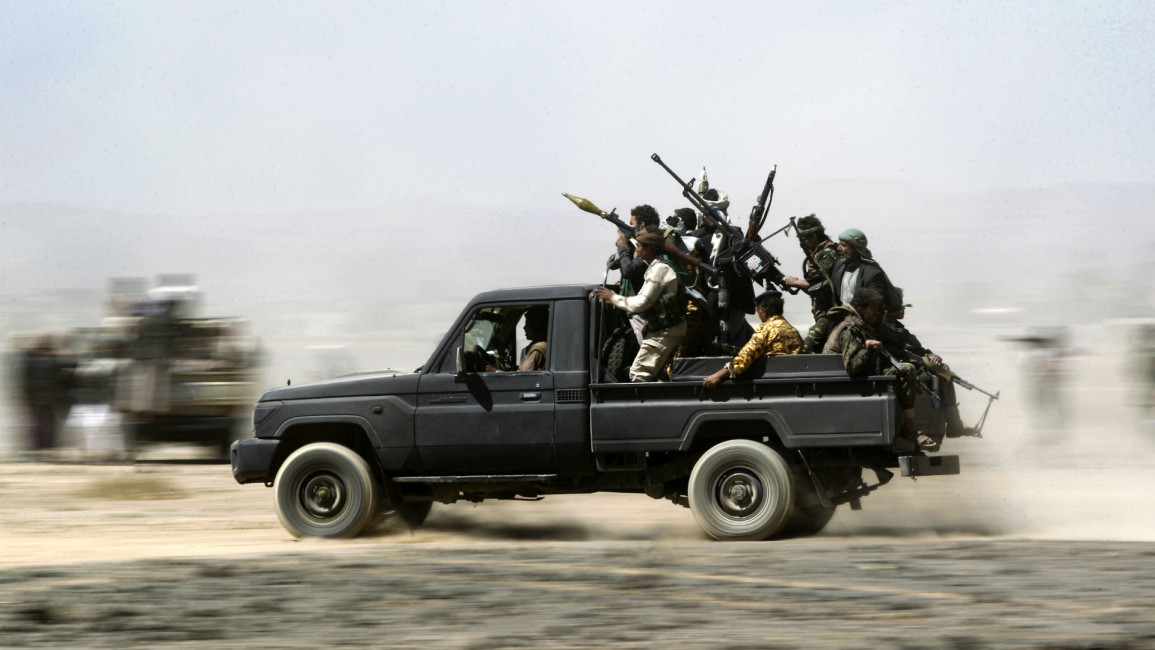Iran using 'new routes' to smuggle weapons to Houthi rebels in Yemen
Iran's Revolutionary Guards have started using a new route across waters in the Gulf to funnel arms to Houthi rebels in Yemen, Western and Iranian sources say.
The Saudi-led coalition's war against Houthi rebels in Yemen has cost more than 13,000 lives since March 2015 and brought the country to the brink of famine.
Iran had previously shipped weapons to the Houthis either directly to Yemen or via Somalia, but the route risked contact with international naval vessels on patrol.
For the last six months, the Islamic Revolutionary Guards Corps (IRGC) has begun using waters further up the Gulf between Kuwait and Iran to ensure arms shipments reach Yemen, Western and Iranian sources told Reuters in exclusive interviews.
"Parts of missiles, launchers and drugs are smuggled into Yemen via Kuwaiti waters," said a senior Iranian official.
"The route sometimes is used for transferring cash as well."
"What is especially smuggled recently, or to be precise in the past six months, are parts of missiles that cannot be produced in Yemen", he added.
Iranian ships transfer the equipment to smaller vessels at the top of the Gulf in Kuwaiti waters and nearby international shipping lanes, the sources said.
Safe routes
Since March, there has been an increase in suspicious activity involving Iranian-flagged ships in waters near Kuwait, Western shipping and security sources say.
Every day, hundreds of ships sail through the Bab el-Mandep and Strait of Hormuz which pass along the coasts of Iran and Yemen.
Many are small dhows which are hard to track.
An arms dealer based in the Mediterranean area, who declined to be identified, told Reuters that waters around Kuwait were being used by Iran to smuggle weapons to Yemen.
 |
Every day, hundreds of ships sail through the Bab el-Mandep and Strait of Hormuz which pass along the coasts of Iran and Yemen. |  |
"Consignments are either transferred to other craft, such as small boats, or they are dropped near buoys to be picked up by passing ships."
The dealer said that coves and deserted bays in neighbouring Iraq also provided opportunities for covert activity.
"The volume of the activity, I don't call it a trade, is not very large. But it is a safe route," a second senior Iranian official told Reuters.
"Smaller Iranian ports are being used for the activity as major ports might attract attention."
Asked if the IRGC was involved, the official said "no activity goes ahead in the Gulf without the IRGC being involved."
"This activity involves a huge amount of money as well as transferring equipment to Iranian-backed groups in their fight against their enemies."
The IRGC declined to comment on the arms shipments and Iranian foreign ministry officials could not immediately be reached.
'Plenty of room for smugglers'
Such arms shipments are not thought to significantly affect the dynamics of the conflict, but allow Houthi rebels to receive stable equipment supplies otherwise hard to obtain.
UN investigators told the Security Council in their latest confidential report, seen by Reuters, that the UAE had reported 11 attacks since September last year against its ground forces using drones, or explosive-laden UAVs.
"Although Houthi-aligned media announced that the Sanaa-based Ministry of Defence could manufacture the UAV, in reality they are assembled from components supplied by an outside source and shipped into Yemen," the report said, according to Reuters.
 |
The Saudi-led military coalition has had limited success so far in 2017 in intercepting military equipment |  |
Houthis "will eventually deplete their limited stock of missiles", the report added, leading to a potential end in missile attacks unless they are resupplied from external sources.
The Saudi-led military coalition, including the UAE, have had limited success so far in 2017 in intercepting military equipment, with no reported seizures this year in Gulf waters and only a few seizures on mainland routes.
In March, a Houthi leader told Reuters that accusations of Iranian-smuggled weapons into Yemen were an attempt by Saudi Arabia to cover up failures in the war.
Kuwaiti officials did not respond to questions, while a US Navy spokesman had no information on the issue.
"There is still plenty of room for smugglers to operate,” he said.
"In fact the whole Persian Gulf is a hive of small boat activity. And this is in an area where one man's illegitimate trade is another's legitimate trade."



